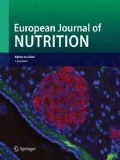Abstract
Background
The aim of this study was to investigate whether consumption of Lactobacillus plantarum HEAL 9 (DSM 15312) and Lactobacillus paracasei 8700:2 (DSM 13434) could affect naturally acquired common cold infections in healthy subjects.
Methods
A randomised, parallel, double-blind placebo-controlled study was performed to investigate whether intake of this probiotic mixture could reduce the risk of common cold episodes, number of days with common cold symptoms, frequency and severity of symptoms, and cellular immune response in common cold infections. A total of 272 subjects were supplemented daily with either 109 cfu (colony forming units) of probiotics (N = 135) or control (N = 137) for a 12-week period.
Results
The incidence of acquiring one or more common cold episode was reduced from 67% in the control group to 55% in the probiotic group (p < 0.05). Also, the number of days with common cold symptoms were significantly (p < 0.05) reduced from 8.6 days in the control group to 6.2 days, in the probiotic group, during the 12-week period. The total symptom score was reduced during the study period from a mean of 44.4 for the control group to 33.6 for the probiotic group. The reduction in pharyngeal symptoms was significant (p < 0.05). In addition, the proliferation of B lymphocytes was significantly counteracted in the probiotic group (p < 0.05) in comparison with the control group.
Conclusion
In conclusion, intake of the probiotic strains Lactobacillus plantarum HEAL 9 (DSM 15312) and Lactobacillus paracasei 8700:2 (DSM 13434) reduces the risk of acquiring common cold infections.


Similar content being viewed by others
References
Heikkinen T, Järvinen A (2003) The common cold. Lancet 361(9351):51–59
FAO/WHO Health and nutritional properties of probiotics in food including powder milk with live lactic acid bacteria. http://www.who.int/foodsafety/publications/fs_management/en/probiotics.pdf
Leyer GJ, Li S, Mubasher ME, Reifer C, Ouwehand AC (2009) Probiotic effects on cold and influenza-like symptom incidence and duration in children. Pediatrics 124(2):72–79
Hatakka K, Savilahti E, Pönkä A, Meurman JH, Poussa T, Näse L, Saxelin M, Korpela R (2001) Effect of long term consumption of probiotic milk on infections in children attending day care centres: double blind, randomised trial. BMJ 322(7298):1327
de Vrese M, Winkler P, Rautenberg P, Harder T, Noah C, Laue C, Ott S, Hampe J, Schreiber S, Heller K, Schrezenmeir J (2005) Effect of Lactobacillus gasseri PA 16/8, Bifidobacterium longum SP 07/3, B. bifidum MF 20/5 on common cold episodes: a double blind, randomized, controlled trial. Clin Nutr 24(4):481–491
de Vrese M, Winkler P, Rautenberg P, Harder T, Noah C, Laue C, Ott S, Hampe J, Schreiber S, Heller K, Schrezenmeir J (2006) Probiotic bacteria reduced duration and severity but not the incidence of common cold episodes in a double blind, randomized, controlled trial. Vaccine 24(44–46):6670–6674
Winkler P, de Vrese M, Ch Laue, Schrezenmeir J (2005) Effect of a dietary supplement containing probiotic bacteria plus vitamins and minerals on common cold infections and cellular immune parameters. Int J Clin Pharmacol Ther 43(7):318–326
Lavasani S, Dzhambazov B, Nouri M, Fåk F, Buske S, Molin G, Thorlacius H, Alenfall J, Jeppsson B, Weström B (2010) A novel probiotic mixture exerts a therapeutic effect on experimental autoimmune encephalomyelitis mediated by IL-10 producing regulatory T cells. PLoS One 5(2):1–11
Antonsson M, Molin G, Probi AB (2003) New strains of Lactobacillus paracasei, patent EP1313837. Available at http://v3.espacenet.com/publicationDetails/originalDocument?CC=EP&NR=1313837B1&KC=B1&FT=D&date=20051214&DB=EPODOC&locale=se_SE
Molin G, Ahrné S, Jeppsson B, Vasquez A, Berggren A, Probi AB (2006) WO patent application 2006038869. Available at http://v3.espacenet.com/publicationDetails/biblio?CC=WO&NR=2006038869A1&KC=A1&FT=D&date=20060413&DB=EPODOC&locale=se_SE
Vásquez A, Ahrné S, Jeppson B, Molin G (2005) Oral administration of Lactobacillus and Bifidobacterium strains of intestinal and vaginal origin to healthy human females: Re-isolation from faeces and vagina. Microbial Ecology in Health and Disease 17:15–20
Macknin ML, Piedmonte M, Calendine C, Janosky J, Wald E (1998) Zinc gluconate lozenges for treating the common cold in children: a randomized controlled trial. JAMA 279(24):1962–1967
Ahrné S, Nobaek S, Jeppsson B, Adlerberth I, Wold A, Molin G (1998) The normal Lactobacillus flora of healthy human rectal and oral mucosa. J Appl Microbiol 85:88–94
Haarman M, Knol J (2006) Quantitative real-time PCR analysis of fecal Lactobacillus species in infants receiving a prebiotic infant formula. Appl Environ Microbiol 72(4):2359–2365
Fendrick AM, Monto AS, Nightengale B, Sarnes M (2003) The economic burden of non-influenza-related viral respiratory tract infection in the United States. Arch Intern Med 163(4):487–494
Tubelius P, Stan V, Zachrisson A (2005) Increasing work-place healthiness with the probiotic Lactobacillus reuteri: a randomised, double-blind placebo-controlled study. Environ Health 4:25
Pregliasco F, Anselmi G, Fonte L, Giussani F, Schieppati S, Soletti L (2008) A new chance of preventing winter diseases by the administration of synbiotic formulations. J Clin Gastroenterol 42(Suppl 3):S224–S233
Macfarlane GT, Steed H, Macfarlane S (2008) Bacterial metabolism and health-related effects of galacto-oligosaccharides and other prebiotics. J Appl Microbiol 104(2):305–344
Kirchberger S, Otto Majdic, Stöckl J (2007) Modulation of the immune system by human rhinoviruses. Int Arch Allergy Immunol 142:1–10
Conflict of interest
The authors are employees at Probi AB, and the study was funded by Probi AB and VINNOVA (The Swedish Governmental Agency for Innovation Systems).
Author information
Authors and Affiliations
Corresponding author
Rights and permissions
About this article
Cite this article
Berggren, A., Lazou Ahrén, I., Larsson, N. et al. Randomised, double-blind and placebo-controlled study using new probiotic lactobacilli for strengthening the body immune defence against viral infections. Eur J Nutr 50, 203–210 (2011). https://doi.org/10.1007/s00394-010-0127-6
Received:
Accepted:
Published:
Issue Date:
DOI: https://doi.org/10.1007/s00394-010-0127-6




